| Srl | Item |
| 1 |
ID:
086826


|
|
|
|
|
| Publication |
2009.
|
| Summary/Abstract |
Since the 9/11 attacks, the Army reserve components(RC)deployed approximately 540,000 soldiers in support of the war on terror. Today, They continue to meet traditional missions whilie transforming into a force that provides both operational flexibility and strategic depth.
|
|
|
|
|
|
|
|
|
|
|
|
|
|
|
|
| 2 |
ID:
127680
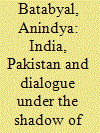

|
|
|
|
|
| Publication |
2011.
|
| Summary/Abstract |
In the wake of the 11 September 2001 terrorist attacks in the US and the subsequent war on terror, the Afghanistan-Pakistan region has emerged as a safe sanctuary for various terror groups like Al-Qaeda, Taliban and Lashkar-e-Taiba. This article focuses upon the close linkages between the legacy of the anti-Soviet jihad inside Afghanistan in the 1980s and the insurgency that later began in the Indian-administered part of Jammu and Kashmir, which from its inception has been aided and abetted by the Pakistan army and its Inter-Service Intelligence Directorate (ISI). Despite international pressure, the infrastructure of terrorism directed against India from Pakistan-controlled territory remains intact due to inaction of the Pakistan government for political and strategic reasons. So long as the symbiotic relationship between sections of the Pakistan government (particularly the army and the ISI) and the various anti-India terrorist groups remains intact, there will be no meaningful progress in any kind of bilateral dialogue between the estranged neighbours.
|
|
|
|
|
|
|
|
|
|
|
|
|
|
|
|
| 3 |
ID:
102323
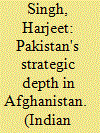

|
|
|
| 4 |
ID:
142345
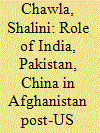

|
|
|
| 5 |
ID:
120698
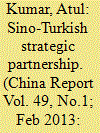

|
|
|
|
|
| Publication |
2013.
|
| Summary/Abstract |
The accelerated growth of Sino-Turkish relations indicates their increasing convergence on foreign, economic and security policies, despite several constraints. The deterioration of Turco-American relationship and frustrated Turkish ambitions of EU membership, coupled with a desire to diversify its arms acquisitions and balance its foreign policy, have led to the readjustments in its foreign and security policy. This realignment has resulted in closer Sino-Turkish partnership and emergence of the strategic cooperation. In China, a growing realisation has emerged in favour of Turkey's geo-strategic and geopolitical importance and its potential as a market for Chinese defence exports. Turkey as a client may impart much sought after international credibility to Chinese weapon manufacturers and a base in Turkey would enhance Chinese access to regional markets. Hence, China has increasingly courted Turkey and Chinese companies have increased their operations inside Turkey. In addition, there are significant convergences between both armed forces on issues of national security, separatism and terrorism. Consequently, strategic cooperation between China and Turkey has increased considerably in the last decade.
|
|
|
|
|
|
|
|
|
|
|
|
|
|
|
|
| 6 |
ID:
132514
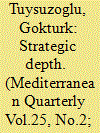

|
|
|
|
|
| Publication |
2014.
|
| Summary/Abstract |
The change in Turkish foreign policy in the twenty-first century's second decade has its origin in the approach referred to by Turkish foreign minister Ahmet Davutoglu as Strategic Depth. Because it aims to give Turkey status as a Eurasian power, this approach has been described as neo-Ottomanism, referencing the geographic extent of the Ottoman Empire. Because of its intrinsic pragmatism and the geographical region that is its focus, Strategic Depth has been influenced by Eurasianist thought in Russia. But the Strategic Depth approach differs from Russian Eurasianist ideas because it refuses to place itself in conflict with Western civilization and instead positions Turkey as a bridge between Western and Muslim civilizations. To this extent, Strategic Depth may be described as a conservative interpretation of Turkish Eurasianism.
|
|
|
|
|
|
|
|
|
|
|
|
|
|
|
|
| 7 |
ID:
113815
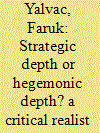

|
|
|
|
|
| Publication |
2012.
|
| Summary/Abstract |
This paper is an attempt to provide a critical realist analysis of the concept of 'strategic depth' recently being used in analysing Turkish foreign policy. The article provides a criticism of the realist geopolitical thinking on which the concept of strategic depth is based using the insights of the critical realist philosophy of science. It takes the concept of ontological depth from critical realism and extends it to Gramsci's analysis and develops the concept of hegemonic depth. Underlying the concept of hegemonic depth is the idea that geopolitical relations should be thought of in connection with the social structures that give rise to them. The article is intended as a contribution to a historical materialist analysis of Turkish foreign policy where a state-centric positivism dominates, as well as an attempt to develop a social theory of foreign policy based on critical realism.
|
|
|
|
|
|
|
|
|
|
|
|
|
|
|
|
| 8 |
ID:
138211
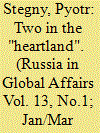

|
|
|
|
|
| Summary/Abstract |
Russian President Vladimir Putins visit to Turkey in December 2014 coincided with the anniversary of his first trip there in December 2004 and crowned a ten-year period of active relations between the two countries during "the Putin-Erdogan era." The results of Putins visit indicate that the current level of multifaceted partnership has not ended and could go further as elements of strategic cooperation emerge.
|
|
|
|
|
|
|
|
|
|
|
|
|
|
|
|